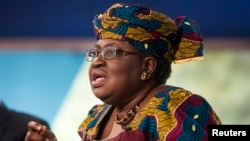A barrel of oil now costs just under $80, and for Nigeria, that's a problem.
Oil makes up 83 percent of the country's exports, and 70 percent of the revenue in Africa's largest economy.
But months before the February presidential election that will see incumbent Goodluck Jonathan stand for a second full term, oil is now trading at its lowest price in four years.
Finance Minister Ngozi Okonjo-Iweala announced over the weekend a raft of measures the government would take to cushion itself against falling prices. These include new taxes on luxury cars, private jets and champagne, as well as a 6 percent cut in government spending.
"We all know that these are global factors, not very much in the control of a country like Nigeria, or many of the oil-producing countries," Okonjo-Iweala said. "But there are number of international factors leading to it, from geopolitical to economic, the production of shale oil, certain geopolitical tensions, all are coming together to impact oil prices.
"But even if we can't affect the prices, we can control, and will control the way that the country responds," she said.
A glut of supply caused in part by increased oil exports from shale oil fields in the United States as well as slowing growth in Europe and weakening demand from Asia is behind the drop in prices.
Government faulted
But Bismarck Rewane, CEO of Financial Derivatives Company Limited in the commercial capital Lagos, said the government has failed over the years to insulate the economy from oil price shocks, leaving it vulnerable to price drops like this one.
"This is crunch time for Nigeria," Rewane said. "And the reality is that how do you actually deal with this?"
"The impact is simple, a 35 percent drop in income means you have to decide what projects you're going to defer, what projects you're going to cancel and are you going to include the revenue base? What has been announced so far is a step in the right direction but not enough," he continued.
Nigeria's persistent insecurity in the oil-producing Niger Delta is another worry. Militants have for years sabotaged oil pipelines and made off with fuel, undercutting production.
Pabina Yinkere, head of research at Lagos-based Vetiva Capital Management, said missing production goals would cause further harm to Nigeria's budget.
"If our production volumes fail to meet up with budget, I think that's the biggest threat. Regarding the price there's nothing we can do about that, market-determined. What we may have control over is how much oil we produce," Yinkere said.
Nigeria's currency has also suffered from the price drop, as investors grow nervous that a shortage of dollars from oil sales could undercut the naira's value.




